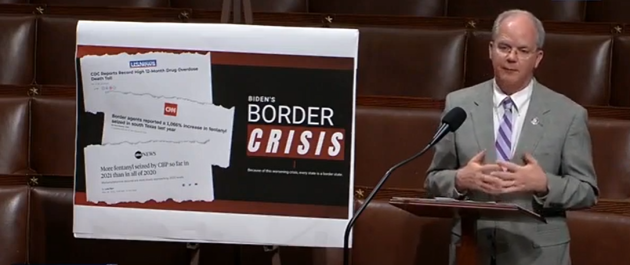Guthrie Pushes to Keep Ban on Fentanyl-Related Substances
WASHINGTON, D.C. – Congressman Brett Guthrie (KY-02) spoke on the House floor yesterday in support of the HALT Fentanyl Act.
Guthrie is an original cosponsor of the HALT Fentanyl Act, which would permanently extend the class-wide scheduling of illicit fentanyl-related substances, also known as fentanyl analogues, and provide a streamlined process for researching possible clinical uses of fentanyl. Currently, fentanyl analogues are temporarily classified as a Schedule I controlled substance under the Controlled Substances Act (CSA), which means it has a high potential for abuse and no known medical use.
To proactively protect the public, the Drug Enforcement Administration (DEA) under the Trump Administration used its statutory authority to schedule fentanyl analogues for two years as Schedule I drugs in 2018. Congress has followed suit multiple times to temporarily extend this emergency scheduling. On February 18th, the class-wide scheduling of fentanyl analogues will expire. If Congress allows the class-wide scheduling of fentanyl analogues to expire, many of these fentanyl analogues would become street legal.
Class-wide scheduling of fentanyl analogues helps save lives by reducing incentivizes for criminals to create new variations of the fentanyl molecule to try to circumvent the Controlled Substances Act and evade law enforcement and prosecution. In 2016 and 2017, there were 7,058 reports of fentanyl analogue encounters that were not individually on DEA’s Schedule. From 2018 to 2019, with the temporary class-wide scheduling of fentanyl analogues in place, there were 787 encounters. DEA officials contributed the class-wide scheduling of fentanyl analogues to being effective at reducing incentives to create new versions of fentanyl analogues.
Guthrie and several other House Republicans spoke on the House floor yesterday evening about the need to permanently address this issue.
As Prepared for Delivery
The rising number of drug overdoses is one of our greatest public health threats, and illicit fentanyl is one of the main drivers. The class-wide ban of fentanyl analogues expires February 18th, and if Congress doesn’t act to extend the ban on fentanyl analogues, many of these illicit drugs would essentially become street legal.
For context, fentanyl analogues have been found to be four to five times more potent than fentanyl, and fentanyl is 50 times stronger than heroin. In Kentucky, fentanyl was responsible for over 70% of all drug overdoses in 2020, and even tragically took the life of a 2-year-old who ingested opioids laced with fentanyl that he found in his mom’s purse. More recently, a 13-year-old overdosed from fentanyl in Connecticut and authorities recovered around 100 bags of fentanyl in his bedroom.
The purpose of permanently scheduling in a class-wide ban is to save lives by reducing a criminal’s incentive to develop new variations of fentanyl analogues to try to evade law enforcement, and we’ve seen fewer new fentanyl analogue encounters during this ban. I’m working to permanently schedule fentanyl analogues by passing the HALT Fentanyl Act. I’m disappointed that Democrats today blocked consideration of the HALT Fentanyl Act.
Now is not the time scale back our fight against these deadly drugs. We need to permanently schedule fentanyl analogues and secure our Southern border to stop these poisons from reaching our communities or else thousands more American lives will be at stake.



























